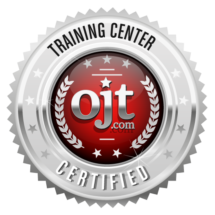
INDUSTRY-LEADING LIVE
INSTRUCTOR-LED TRAINING
World Class Training Content, Delivered On-Demand
BRIDGING THE GAP
between career seekers
& employers
from COAST-TO-COAST

World Class Training Content, Delivered On-Demand
between career seekers
& employers
from COAST-TO-COAST
CNC Machinist / Operator
QUALIFICATIONS
CNC stands for “Computer Numerically Controlled” i.e. machine and equipment that are controlled and calibrated digitally by computers and related software, instead of human instrumentation control; to perform its operations. A high school or General Educational Development (GED) CNC Tradespersons diploma and certifications like CNC Machining Certificate (CMC), CNC Programming Certificate (CPC), etc., with or without an Associate Degree, requisite CNC Machining study and practice credit hours of around 6 months to a year; combined with – On the Job Training (OJT) programs, Apprenticeships, CNC Machinist/ Operator Workforce Job Training or Experience; covering CNC operations work topics including reading blueprints, mechanical diagrams, calculating height, weight and volume i.e. mathematics for machining, tools, tool design and fabrication, apparatus, tools, metals and materials, CNC setup & operations, safety protocols, and maintenance, and knowledge of CAD/ CAE/ CAM software, computer programming, systems & technologies relating to CNC operations.
AVERAGE HOURLY PAY
(Credits: www.payscale.com)
| Entry-level (0-12 months) | $ 14.48 |
| Early career (1-4 years) | $ 15.51 |
| Mid-career (5-9 years) | $ 17.38 |
| Experienced (10+ years) | $ 18.47 |
PROJECTED GROWTH
(Credits: www.bls.gov)
CNC Machinist / Operator is a great career, in which employment is expected to grow at a steady 4 percent from 2019 to 2029.
SKILLS/ TRAITS NEEDED
Besides good technical & functional knowledge of CNC machinery operations, CNC Machinists / Operators must be computer savvy with knowledge of CAD/ CAE/ CAM, computer programming, systems & technology; with the ability to read, understand and interpret blueprints, mechanical diagrams, and drawings, converting them into computer commands for a precision CNC work function. They must be great troubleshooters with strong structured, critical & logical thinking and problem-solving skills; self-motivated, self-organized, and follow safe work practices with extreme focus, great memory, and attention to precision and detail, ensuring timely work completion of their tasks in hand. They also must be professional, ethical, proactive, agile, and alert with a high degree of patience and perseverance; have a great memory, willingness to learn and adapt, listening communication, and interpersonal skills.
WORK FUNCTIONS
CNC Operators and Machinists operate computer numerically controlled (CNC) machinery to perform precision tasks such as cutting, drilling, grinding, milling, etc. They read, interpret and understand blueprints, mechanical drawings, etc., translating the instructions into computer commands that make the machines perform the required functions with precision & accuracy adhering to the specifications and requirements. Their activities include planning, setting up, prepping, and calibrating the CNC machine, loading raw materials, adjusting controls, monitoring the test-runs and the final product outputs; to meet quality assurance and quality control (QA/ QC) standards & production targets, preventative CNC machine maintenance keeping them functioning smoothly & safely, maintaining production & material records, ordering materials & supplies, etc. Besides being responsible for the upkeep of the CNC machines, trouble-shooting, resolving, or escalating issues they may also be required to train juniors, handle contractors, perform repairs, and keep the work areas clean and organized. Additionally, besides the operation of the CNC machines, they need to stringently adhere to and follow all safety procedures guidelines issued by Occupational Safety and Health Administration (OSHA). CNC operators and machinists work mostly for the manufacturing sector. They may be needed to work in shifts.
Related Careers